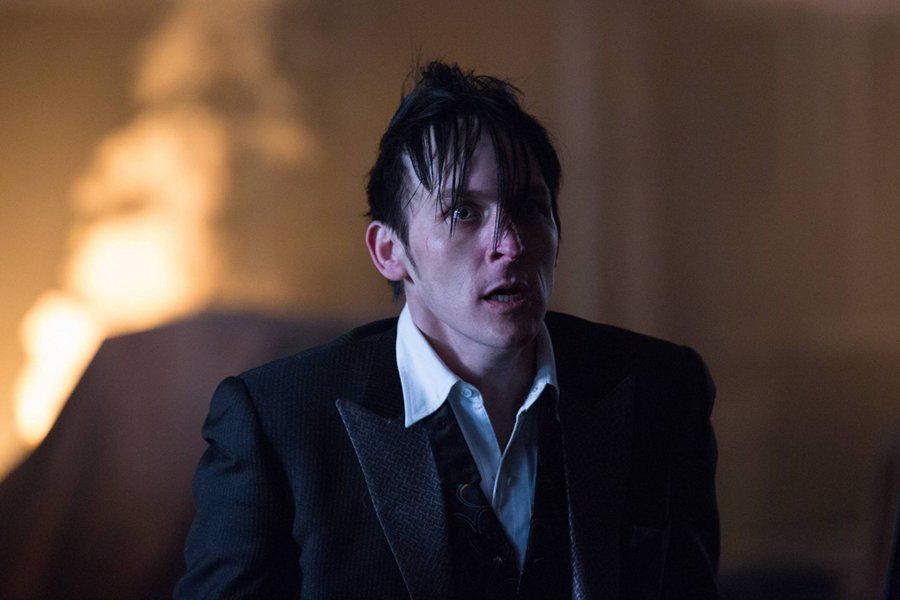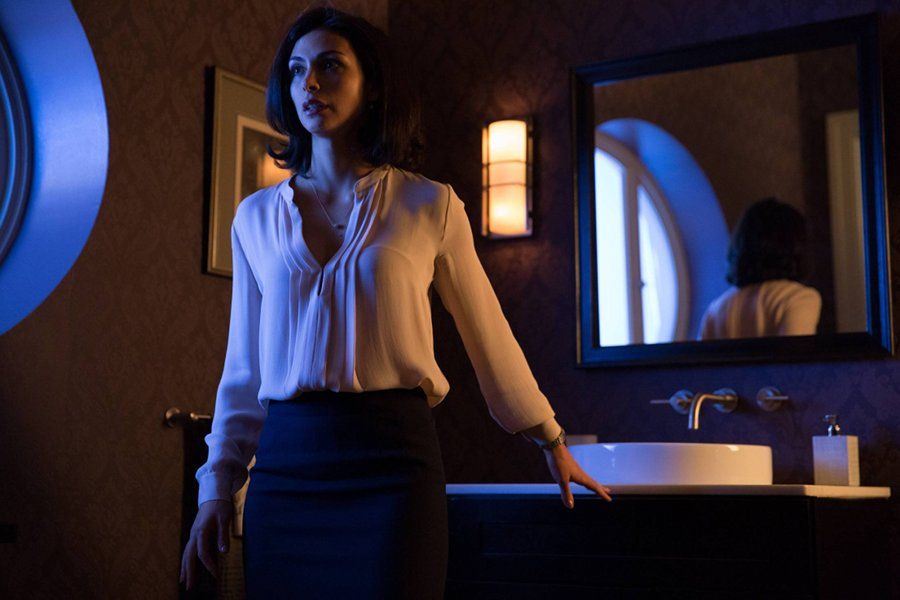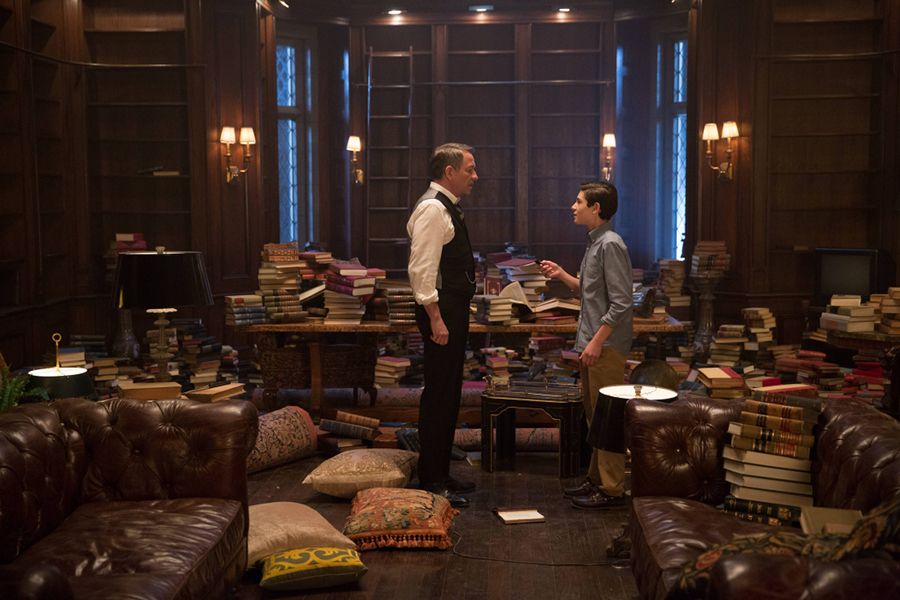When Fox's DC Comics-inspired drama Gotham debuted last fall, the promise was a massive interlocking origin story for the world of the Dark Knight Detective. And while it's first episode was a generally uneven affair, it asked questions that had the potential to explore some new territory in the Batman mythos: what drove Jim Gordon to become Gotham's white knight? How did the city's rogue's gallery discover their alter egos? And most promisingly, how was the killer of Bruce Wayne's parents caught?
With last night's Season 1 finale, those questions were answered in the following ways: "Not much beyond angry moral posturing," "Generally being crazy and inconsistent" and "Who cares? We give up."
But at this point, cataloging the many ways in which Gotham has failed to develop its central premise beyond a flimsy collection of crime story clichés is old hat (though let's do it one more time anyway). Even the series defenders admit that the show has never aspired to more than being a slice of comic book pulp – a collection of would-be funnybook Easter eggs and gonzo scenery chewing performances. And if the finale tried to succeed on these levels (as it occasionally has throughout the season) maybe its lack of internal logic could be forgiven some. But the worst thing about the show runner Bruno Heller-penned episode "All Happy Families Are Alike" is how frustratingly dull it is from start to finish.
After weeks off screen (and months after Jada Pinkett-Smith announced her exit from the show altogether), Fish Mooney resurfaces on Gotham's shores ready for revenge. Lucky for the plot, she immediately meets and takes a shining to Selina "Cat" Kyle, and then the pair proceed to disappear in a convenient "Three Weeks Later" time shift.
By the time we return to the story of the season, we're told that the mob war sparked by Penguin last episode has exploded to critical mass. After a year of being nothing more than a series of mob boss stereotypes, Sal Maroni has apparently not only clawed his way to the top of the battle for the underworld, he's also been labeled "a crazed and dangerous force" whose victory will undoubtedly send the city into utter chaos. For some reason, Penguin himself feels the need to expedite this event by kidnapping and killing his patron Carmine Falcone in a nearby hospital. As the sniveling excuse for a master villain leans in to torture his former boss with a scalpel, Jim Gordon shows up just in time to confirm that every moment of potential drama in the episode will have its legs knocked out from beneath it.
That's the real theme of this episode: an escalating series of completely undramatic showdowns. Jim stops Oswald and his brainwashed buddy Butch only to sneer off against corrupt Commissioner Loeb about how letting Falcone resume his place as Gotham's top mobster will (somehow?) save the city. But does anyone ever think Gordon will actually leave Penguin behind to die at the hands of Maroni's men? Or that Falcone's life is truly in any actual danger? When Jim takes on a fleet of goombas with a machine gun, the scene is meant to be tense, violent and imperiling. But with every improbably bullet he dodges and/or lands in the skull of an enforcer, the proceedings feel about as weighty as watching your pal play the same Call of Duty level over and over again.
When Bullock joins the quartet and they head from the hospital to Falcone's "safe warehouse," they're beset by Fish and Selina – now best pals and co-founding members of the "Viral Marketing For The New Mad Max Via Cosplay Society." Rather than killing any of their prey immediately, Fish strings the boys up to hand them over to Maroni. From there, the viewer is treated to a cascading series of insanely stupid and impractical "near death" experiences. Rather than killing them himself, Maroni monologues his way through his masterplan to be Gotham's big boss. His frustratingly lame mocking of Fish forces her to shoot the Sal in the head – a move that could have been surprising except for the fact that it only led to a room full of gangsters with machine guns failing to kill anyone of note even as four characters hung from meet hooks.
Gordon, Bullock and Falcone escape. They're caught again and threatened. They escape again. And so on and so forth. The actual chance of anything happening besides weak tea threats and poorly choreographed fight scenes plummets with each passing moment. And each time the episode attempts to deliver a surprise, it botches the attempt in spectacular fashion. For example, when Fish and Penguin find themselves at each others' throats atop a building, Butch has the option of fighting or failing to his programming and killing one of them. He instead caps each with a useless flesh wound, robbing the scene of any tension. When Penguin finally drops Fish into the waters below, he climbs atop a ledge and cackles as if to declare "This show is finally over, and it's done everything you expected and nothing more! Haha!"
Meanwhile, the two women in Gordon's life for some reason meet at Barbara's apartment for a 12-hour therapy session whose contents take the Bechdel Test out back and waterboard it. The complete disregard for anything resembling actual trauma therapy is a snoozer to watch until Barbara comes out of her shell as the murderer of her own parents and smiles that "They all said I was crazy, but would a crazy person laugh this crazily?" smile trademarked by a million '80s horror movies. To the show's credit, her rolling around and grunting malevolently is probably the most affecting Barbara's character has been all season, but that's not saying much.
Oh, and speaking of cartoonish madness, Edward Nygma is called out by the object of his stalking for having left the world's dumbest clue to the murder of her boyfriend. This leads to a "I'm hearing voices" montage so boilerplate, they may as well use it in the textbook for "Mediocre TV Drama 101."
The most exhausting of the episode's many predictable plotlines involves Bruce Wayne and Alfred investigating a heretofore undeveloped and unremarkable "secret" held by Bruce's father. Locking themselves in his study as he apparently did, the pair tear the room apart bit by bit looking for a hidden clue. Of course, at the last minute Bruce realizes something that had no bearing on any episode of the show all season and therefore triggers a moment everyone knew would be shown exactly as it is eventually: the secret passage to the Batcave.
That Gotham serves up uninspired takes on the Batman story's grace notes as if they've reinvented the wheel is not just the show's biggest problem because it's really lame. It also crowds out anything resembling a decent moment. Falcone ends the episode (and his run on the series) by giving Gordon a knife once gifted by the hero cop's late D.A. father. The connection between the two elder Gothamites was jettisoned from the series in its early episodes, and it's a shame. That kind of small metaphorical detail can serve to humanize a series' characters and shade its overall portrayal, but as it stands, those kinds of scenes are an afterthought. Luckily, this show will soon be a similar footnote in the Dark Knight's decades-long career.




